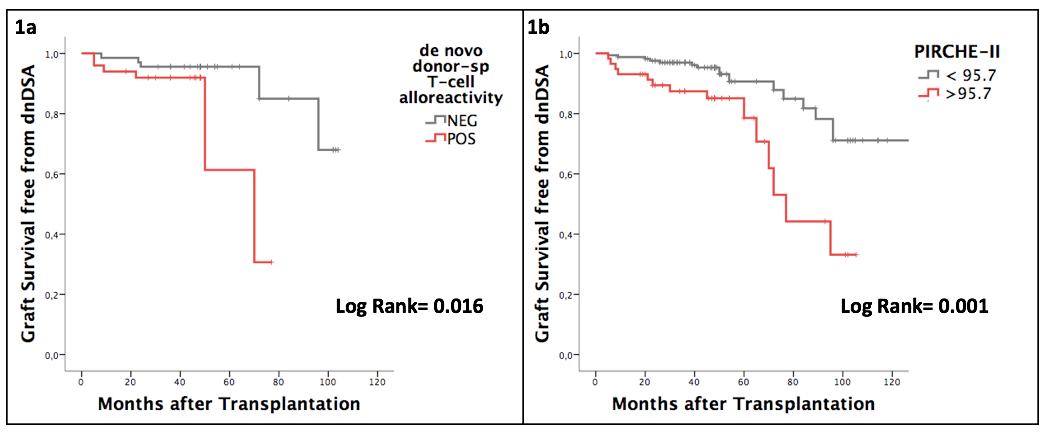Donor-Recipient HLA Mismatched Peptides Calculated by PIRCHE Algorithm Associate with De Novo Donor-Specific Cellular and Humoral Alloreactivity and Predicts Inferior Graft Outcome
1Kidney Transplantation Unit, Bellvitge University Hospital- IDIBELL, L'Hospitalet de Llobregat. Barcelona, Spain, 2Experimental Nephrology Laboratory, IDIBELL, L'Hospitalet de Llobregat. Barcelona, Spain, 3PIRCHE AG, Berlin, Germany, 4Kidney Transplantation Unit, Bellvitge University Hospital, L'Hospitalet de Llobregat. Barcelona, Spain
Meeting: 2019 American Transplant Congress
Abstract number: B69
Keywords: Allorecognition, Histocompatibility, HLA antibodies, T cell activation
Session Information
Session Name: Poster Session B: Biomarkers, Immune Monitoring and Outcomes
Session Type: Poster Session
Date: Sunday, June 2, 2019
Session Time: 6:00pm-7:00pm
 Presentation Time: 6:00pm-7:00pm
Presentation Time: 6:00pm-7:00pm
Location: Hall C & D
*Purpose: PIRCHE-II algorithm predicts mismatched donor-derived HLA peptides number presented on recipient HLAclass-II molecules to recipient T-cells (indirect pathway of allorecognition) and has been associated to de novo donor-specific antibodies (dnDSA) formation and graft outcome. Since indirect pathway of allorecognition plays a role on T-cell activation after Kidney Transplantation (KTx) we hypothesized that a high PIRCHE-II score would predict de novo activation of donor-specific (d-Sp)T-cell activation after KTx.
*Methods: In 266 consecutive KTx patients without preformed DSA, donor/recipient mismatch using PIRCHE-II algorithm was evaluated. De novo d-Sp T-cell alloimmunity by both direct and indirect pathways of allorecognition using IFN-y ELISPOT assay, dnDSA and graft outcomes were assessed after at least 24months of follow-up (69-30).
*Results: 16% of patients developed acute rejection (AR) during follow-up. PIRCHE-II score did not associate with AR but PIRCHE-II, DR and DQ scores were higher in patients developing antibody-mediated rejection (117±31vs74±35,p=0.008;20±13 vs11±9,p=0.04 and 30±10 vs18±14,p=0.07). Pre-KTx d-Sp T-cell alloreactivity was observed in 49% of patients, whereas 20% showed de novo d-Sp T-cell alloreactivity after KTx. Notably, patients with de novo d-Sp T-cell alloreactivity displayed higher PIRCHE-II and DR score compared to quiescent T-cell alloreactive patients (91±29 vs 67-28, p=0.03 and 16±7 vs 9±8, p=0.01). Furthermore, patients with de novo d-Sp T-cell alloreactivity as well as those with high PIRCHE-II score were at higher risk of developing dnDSA (HR=4.5,95%CI1.2-17,p=0.02;HR=1.012,95%CI1.003-1.02,p=0.009 for T-cell alloreactivity and PIRCHE-II, respectively) (Figure 1a,1b). Finally, a higher PIRCHE-II score independently predicted death-censored graft survival in a multivariate analysis (HR=5.3,95%IC=1.3-21,p=0.017).
*Conclusions: A poor donor/recipient HLA matching assessed by PIRCHE-II algorithm discriminates patients at higher risk of post-transplant d-Sp T-cell alloimmunity as well as those subsequently developing dnDSA and a poorer graft outcome.
To cite this abstract in AMA style:
Meneghini M, Crespo E, Niemann M, Torija A, Melilli E, Jarque M, Montero N, Cruzado J, Grinyo J, Bestard O. Donor-Recipient HLA Mismatched Peptides Calculated by PIRCHE Algorithm Associate with De Novo Donor-Specific Cellular and Humoral Alloreactivity and Predicts Inferior Graft Outcome [abstract]. Am J Transplant. 2019; 19 (suppl 3). https://atcmeetingabstracts.com/abstract/donor-recipient-hla-mismatched-peptides-calculated-by-pirche-algorithm-associate-with-de-novo-donor-specific-cellular-and-humoral-alloreactivity-and-predicts-inferior-graft-outcome/. Accessed March 3, 2026.« Back to 2019 American Transplant Congress

